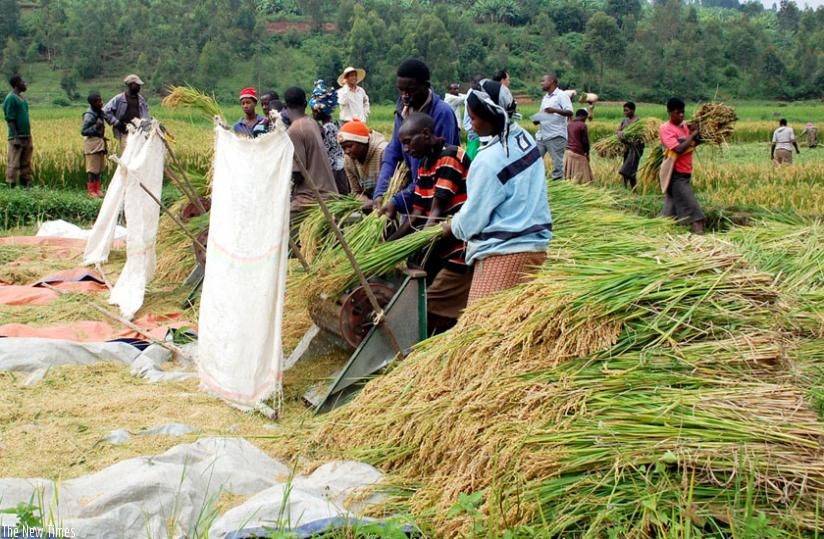Rwanda loses $65 million annually on average in crop production-related risks, according to a new agricultural sector risk assessment report released by World Bank on Wednesday.


Rwanda loses $65 million annually on average in crop production-related risks, according to a new agricultural sector risk assessment report released by World Bank on Wednesday.
The study, conducted by World Bank’s agriculture specialist Åsa Giertz, analysed production data between 1995 and 2012 and found that during that period, the country lost about $1.2 billion.
Giertz’s findings were the focus of the World Bank’s annual Rwanda economic update, which was launched on Wednesday under the theme, ‘Managing uncertainty for growth and poverty reduction.’
The expert notes that although agricultural risks are low in Rwanda compared to neigbouring countries, they pose significant consequences for the sector productivity, growth and impedes government’s efforts to transform the sector.
"These risks to the agriculture sector caused production losses worth $1.2 billion between 1995 and 2012, which is about 2.2 per cent of Rwanda’s total annual agricultural production,” said Giertz.
Agricultural risk is defined as an unpredictable event that causes loss or decline to agricultural production or income.
In Rwanda, the risks include adverse fluctuation in commodity and input prices, production-related shocks (from, for example, weather, pests, and diseases), among others.
Others are reliance on rain-fed production and undeveloped irrigation which make production vulnerable to abnormal weather.
Toru Nishiuchi, the World Bank – Rwanda economist and team leader for the economic update, said it’s important that the government identified these risks to allow for more effective management through a set of interventions.
The most risk-prone crops, the report says, are cassava, bananas, Irish and sweet potatoes, dry beans, maize and coffee, while rice and tea are least affected.
It’s noted that coffee and tea, which together account for 20 per cent of Rwanda’s exports, are sensitive to fluctuations on the international market, which expose the country to balance of payment risks.
Experts attending the report’s launch said it was important that stake holders shift the discussion to identifying possible mitigation measures to counter the risks if the set national agriculture targets are to be achieved in time.
Under the second Economic Development and Poverty Reduction Strategy (EDPRS II), the government is targeting to increase the productivity of agriculture with a projected annual sector growth of 8.5 per cent from 5.8 per cent by 2018.
The livelihoods of about 80 per cent of tge population are also dependant on agriculture and transforming the sector is seen as a major gateway to drastically reduce poverty levels.
Mitigation efforts
Innocent Musabyimana, the permanent secretary at the Ministry of Agriculture, acknowledged the risks pointed out in the report but said there are ongoing mitigation efforts by government and other development partners, including the Bank.
Musabyimana said districts like Kayonza and Kirehe that are prone to droughts are benefiting from irrigation schemes to ensure that farmers are in position to produce throughout the year.He said government has made infrastructure development a top priority which will see several feeder roads constructed to link farmers to markets.
Ram Chirumamilla, general manager of Acacia Foods Limited based in Uganda, who is in the country to look for potential investment opportunities to expand his business, said he’s worried by the weak market links for local commodities.
"Many of my friends in India are asking me about Rwanda but I keep telling them to wait because I still see a lot of challenges related to marketing agricultural produce,” Chirumamilla said.
However, Musabyimana allayed the investor’s fears and encouraged him and his friends to come start investing, pledging government commitment to facilitating investors.
Regarding crop pests and diseases, the PS revealed that government is promoting access to quality soya, maize and beans seeds at subsidised prices.
The concern that the agriculture sector is still heavily dependent on weather and other natural factors also featured prominently, with experts noting that such a phenomenon puts production out of the control of farmers.
"It’s important that technology for more advanced weather forecasting because lack of more accurate weather reports has proven to be costly to agriculture in most sub-Saharan African countries where the sector is still heavily dependent on weather,” said Apurva Sanghi, World Bank’s lead economist for Rwanda, Kenya and Eritrea.
The World Bank is one of Rwanda’s leading development partnersm with agriculture as one of its key areas of focus.
According to Carolyn Turk, the World Bank country manager, over $270 million has been used to support various agriculture projects, including in areas of irrigation and water management.
editorial@newtimes.co.rw


